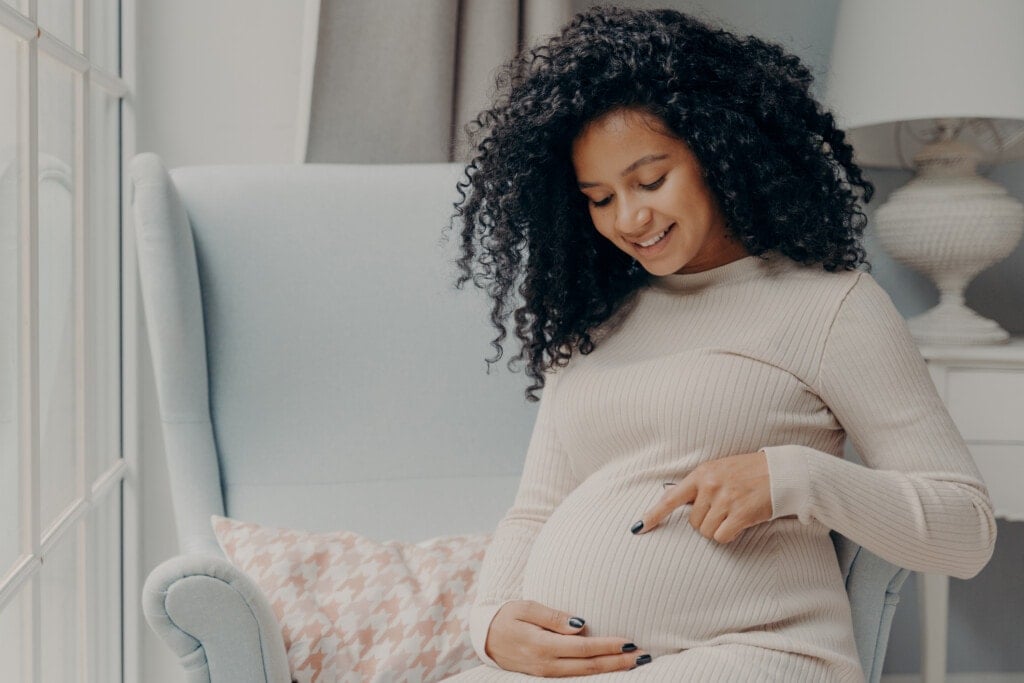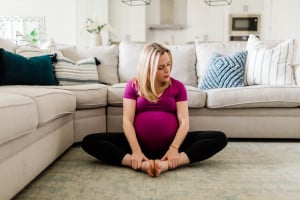Feeling your baby move for the first time during pregnancy is one of the most precious moments you can experience. For many women, it makes the pregnancy feel more real and helps moms-to-be connect to their babies in the womb. Those little flutters and kicks also provide reassurance between check-ups that everything is going smoothly.
You might anxiously await those first little movements if you are in your first trimester or early in the second. So, when will you start to feel your little one move, what can affect when it happens, and is there anything you can do to feel it sooner?
What is ‘Quickening’?
The medical community calls early fetal movements “quickening,” and they are a great sign your baby is growing and strengthening. Your baby starts to move at 12 weeks of pregnancy or sooner, but you cannot feel them just yet because the baby is too tiny and its movements are too soft. As your baby and uterus get bigger, you are more likely to notice and feel their kicks and wiggles.1,2
When Will I Feel My Baby Move?
Pregnant women typically report feeling the earliest baby movements between 16 and 22 weeks. You may not recognize what you feel initially because the movements are small and subtle. Early on, you can mistake gas, gastrointestinal cramping, or abdominal muscle twitching and movement for fetal movements.1
However, you will soon begin recognizing and differentiating your baby’s movements and noticing their patterns. For example, most women are likelier to feel their babies move in the evening or at nighttime. Some women report feeling their babies move more when they have an empty stomach, while others say they have more movement when they are full.3
When Can Others Feel Kicking?
A trained healthcare provider can often feel fetal movement at around 20 weeks of gestation, but it may take much longer for your untrained partner, family, or friends to sense those little nudges. It can also take plenty of patience to feel kicks on the outside when they are still so inconsistent, but very soon, those jabs will be felt or even seen simply by resting a hand on your belly.1
What Does Quickening Feel Like?
Many moms describe their baby’s first movements as feeling like flutters, tapping, or popping. Because your baby is still relatively small at the time of their first movements, you will not be feeling big jolts or kicks yet!
Factors That Affect When You Feel Baby Move
You may feel your baby move for the first time in the second trimester, which is a broad range. But some factors may affect how early or late you first notice your baby’s movement.
Number of Pregnancies
One study showed that second-time moms felt baby movements an average of 1-2 weeks sooner. This may be because they are more familiar with what fetal movements feel like. It could also be because the uterus may be stretched from a recent pregnancy and more sensitive to movement sooner.2,4
Placenta Location
Your placenta can be attached anywhere inside your uterine wall. An anterior placenta is attached to the front of your uterus. This placement can delay quickening by about a week. This may be because the front of your uterus is more sensitive to movement and feeling, and your placenta is blocking it. This does not mean your baby is not moving, but just that you may not be able to feel it quite as soon.4
Body Mass Index
A body mass index above 30 can delay feeling your baby move by about a week. This is perhaps due to body fat dampening the touch sensation of the abdominal wall.5
How Can I Get My Baby to Kick So I Feel It?
While you can rest assured that you will feel your baby kick eventually, if you are eager to feel them moving soon and are within that 16-22-week window, here are a few tricks you can try to get your baby to move during pregnancy:
- Drink ice water
- Have a sugary snack or drink
- Move around and then stop
- Tap or rub your belly
- Sit, relax, and pay attention
- Shine a flashlight on your belly
- Play music or read a book
When Will My Baby’s Movements Be Consistent?
While you may feel your baby move as early as 16 weeks, the movements may not be predictable or consistent for many weeks. During the second trimester, your baby is still tiny, and their awake times and movements are variable and unpredictable.
Around the start of the third trimester, your baby develops patterns, consolidated sleep, and even a “schedule.” At this point, your baby may have predictable calm and active periods throughout the day.6
Consider Kick Counts
Once you notice your baby moving more consistently at certain times of the day, you can consider starting kick counts. You can either be generally aware of your baby’s daily movements to note any apparent decrease or more formally count at least 10 movements within a 1-3-hour period at the same time each day. Many providers recommend this starting in the third trimester or after 28 weeks.1
In addition to helping catch issues early, taking time each day to focus on your baby’s movement can aid in attachment and bonding, especially in second-time moms and moms over the age of 35.7
Soon, your baby will be large enough that its movements are undeniable and sometimes even painful! It can be tough to wait to start feeling your baby move, but once it happens, you will soon forget what it is like not to be jabbed in the belly or the ribs all day and night. Once your baby is big and strong enough, and you know what you are feeling, your baby’s movements will be noticeable. They also serve as a fun little reminder throughout the day that your new baby is very real in your belly and growing daily.










